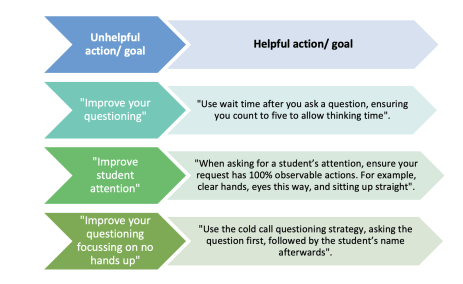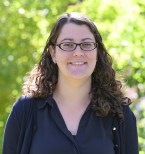Developing an alternative approach
Too often lesson observations are rushed and tokenistic. But is there a realistic ‘best practice’ alternative? Elen Harris thinks so.
The problem with observations
Lesson observations are often conducted during the ‘appraisal season’ as a ‘tick-box’ activity to enable full completion of the required paperwork. There are a number of other negatives:
- There can be a reluctance to ask if an observation is possible outside of this window, further exacerbating a perfunctory culture.
- Even if staff actively want to observe others to develop their practice, available time can be a barrier.
- Too many observations are often simply not developmental.
Alternatives?
I’d like to propose an alternative while suggesting best practice guidelines for observations to keep developing a pedagogy for the benefit of our students.

Figure 1: The proposed instructional coaching cycle
Figure 1 shows a summary of an instructional coaching cycle adopted at Sevenoaks School. Within the appraisal process, each staff member identifies 2 or 3 areas of development which interests them most for the following year and which could either inform one of their appraisal targets, or just be a stand-alone aspect to their professional development.
At Sevenoaks the Institute of Teaching & Learning (ITL) is the department responsible for whole school development of teaching and learning. Each year the ITL analyses individual preferences for professional coaching and places colleagues into small groups with a set theme, each of which become a ‘Learning Community’ for the following year. The group meets once per term, on each INSET day to discuss sources and plan mutual observations in their area of interest. Using INSET days in this way finds the time for us to think about and plan lesson observation in a new way, encouraging a culture of proper instructional coaching which has a crucial influence on learning outcomes (Sims, 2019).
At each meeting, goals for community members are discussed and agreed and a cycle of informal drop-in lesson observations is planned. This ensures that over the course of an academic year there is a carousel of observations between community members, focusing solely on professional feedback in the area of pedagogy being considered by that particular learning community. This is done in an informal way, following best-practice guidelines and using constructive feedback to guide next steps for attaining an individual’s developmental goals.
Evidence suggests that this kind of instructional coaching is the most effective kind of teacher CPD currently available (Sherrington, 2022), and has a ‘better evidence base than any other form of CPD’ for beneficial impact on student outcomes (Farndon, 2019). Furthermore, it has been suggested that coaching works best on a sustained basis with multiple coaching cycles (Sherrington, 2022), with one cycle per term (Burns, 2022) – hence the model we have adopted.
The appraisal process carries on in parallel, though the ‘lesson observation’ section is adapted to be a summary of how a colleague’s pedagogy has developed that year as a result of a completed cycle rather than just a ‘token’ observation. This process is repeated year on year, with staff choosing new areas of interest, or opting to continue further exploration of their current area for a second year.
Developing our practice: learning what works
We have found that it is important for all members of a learning community to build trust and rapport with each other, and for there to be an understanding that conversations are confidential. All learning community meetings and each coaching meeting between individuals after an observation to provide feedback, should, ideally, follow a structure. This takes time to develop, but as the cycle of learning community observations takes place we have found the following general ideas work well:
- Low stakes drop ins are more powerful than high stakes observations.
- Observations work best when both colleagues taking part in an observation
- Have an agreed focus.
- Are enthusiastic and positive.
- Agree when feedback will take place.
- Observations should focus on students: are they learning, engaged, and making progress?
- Observations also focus on how good student-teacher relationships are developed
- Observers can get involved in the lesson!
We have found that observers need to remember that the class teacher knows the class, context, and material, better than them – which means going into an observation with an open mind and trusting their judgement and then discuss the ‘why’ of their decision making. Notes are not necessarily required; it is the conversations had after the observation and new goals set that are most powerful.
What is useful feedback?
We also agree that the best feedback after an observation is specific, ‘actionable, and useful’. The examples in Figure 2 from Tavassoly-Marsh (2022) demonstrate the difference:

Figure 2: Examples of specific, actionable feedback
 Elen Harris is an Institute of Teaching & Learning Research Fellow at Sevenoaks School and is an IB teacher of Geography
Elen Harris is an Institute of Teaching & Learning Research Fellow at Sevenoaks School and is an IB teacher of Geography
FEATURE IMAGE: by poli_ from Pixabay
References:
Burns, R., (2022) Instructional coaching: cycles, systems and processes (online). Available at: https://www.headteacher-update.com/best-practice-article/instructional-coaching-cycles-systems-and-processes-cpd-development-teaching-lessons-pedagogy/244368/ (accessed 18.09.22)
Farndon, S., (2019) What is instructional coaching (online). Available at: https://www.ambition.org.uk/blog/what-instructional-coaching/ (accessed 18.09.22)
Sherrington, T., (2021) Time to replace ‘formal observation’ systems with Instructional Coaching for everyone #CPD (online). Available at: https://teacherhead.com/2021/01/28/time-to-replace-formal-observation-systems-with-instructional-coaching-for-everyone-cpd/ (accessed 18.09.22)
Sims, S., (2019) Four reasons why instructional coaching is currently the best evidence-informed CPD (online). Available at: https://samsims.education/2019/02/19/247/ (accessed 18.09.22)
Tavassoly-Marsh, J., (2022) Instructional coaching: making classroom practice more effective (online). Available at: https://www.loom.com/share/ed45662bb7e844c5fb7371396f945ac4d (accessed 18.09.22).

